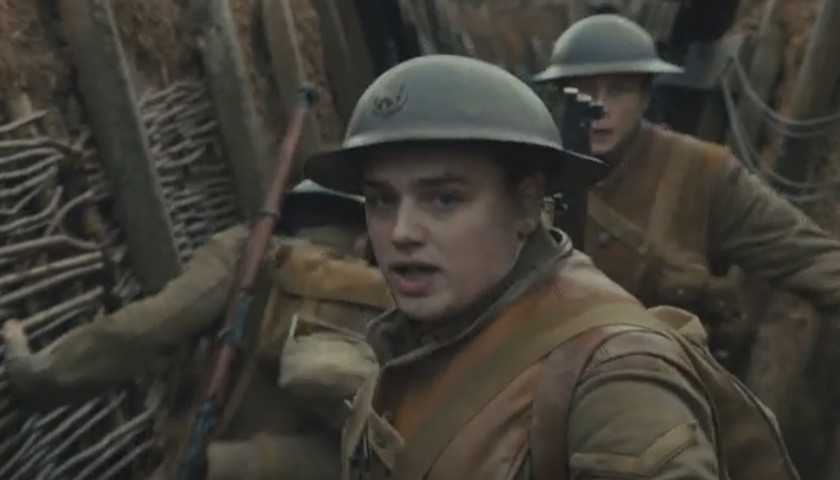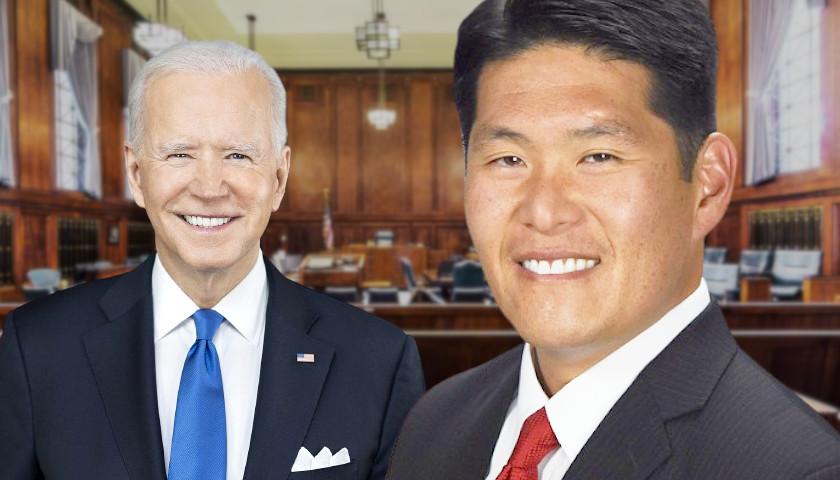by James Carafano
Yes, it’s up for this year’s “Best Picture” Oscar, but that hasn’t stopped critics delivering decidedly mixed reviews to “1917.”
The plot is the stuff of a standard action/adventure flick: two soldiers on a desperate mission to stop a British unit from charging into a trap.
At a more substantive level, however, it’s a movie about the humanity and inhumanity of war. On that front, it’s the best since “Saving Private Ryan” (1998) and definitely worth seeing.
Like Steven Spielberg’s tale of a squad of soldiers trampling around the Normandy countryside after D-Day, this Sam Mendes storyline is equally implausible. As a set piece of military history, it is to be scrupulously ignored.
Yet, there are reasons to engage with “1917” as a serious war film.
For one, the movie gets the details exquisitely right. Here, “Saving Private Ryan” set a high bar. It would be difficult to have a more realistic appreciation for what it was like to land on “Bloody” Omaha Beach during the Normandy invasion without a time machine.
More recently, Chris Nolan’s “Dunkirk” (2017) hit that mark, as well.
These movies have avoided the kind of groaning missteps that detract from otherwise excellent movies like “Patton” (1970), which paraded around “German” armor that were clearly just American tanks painted up with Wehrmacht symbols.
While you can’t smell the retching horror of filth, decay, and cordite in the trenches, “1917” dwells on every visual cue from grinning corpses to the fat rats gorging on the detritus of war.
To understand just how accurate the look of the movie is, compare “1917” to Peter Jackson’s incredible documentary “They Shall Not Grow Old” (2018), which relies exclusively on recovered archival footage from the World War I.
The other point on which the film excels is portraying the human dimension of war.
At the height of the European enlightenment when philosophers were talking about the perfection of human enterprises from economics to governance, Carl von Clausewitz, the great Prussian military theorist, said, “Not so fast.”
Clausewitz was himself a veteran of several campaigns—on both the winning and losing sides. One of the essential insights of his monumental treatise, “On War,” was that conflict was anything but a mechanistic, linear, predictable act.
Soldiers, at their own peril, ignored the foibles, misjudgments, and shortfalls of men in battle and the importance of terrain, the unpredictability of weather, and the many other forces and factors that can determine the outcome of combat. He called it the “fog of war” and the “friction of battle.”
In this film, Clausewitz would have lamented setbacks to the Prussian military, but he would have well appreciated the trials, tests, and uncertainties that confront the soldiers on the way to the front.
Mostly, the film reminds viewers that it is never a good idea to think of war in antiseptic or abstract terms. Whether it’s the decision to go over the top or take out Qassim Suleimani, we must never forget that war is a competition between living, breathing, cunning, determined foes and that the price of failure and, oftentimes, success is always measured in blood and tragedy.
– – –
James Jay Carafano, a leading expert in national security and foreign policy challenges, is The Heritage Foundation’s vice president for foreign and defense policy studies, E. W. Richardson fellow, and director of the Kathryn and Shelby Cullom Davis Institute for International Studies.
Photo “1917 Movie” by IMDB.






1917 – the movie, is not a classic. Not a really bad movie but not a very good movie either.
That year, 1917, was also the chief year of mutinies by soldiers by almost all the major belligerents who were fed up with incompetent generals and other commanding officers along with callous civilian leaders who tossed good soldier after bad into some senseless battle. The biggest mutinies occurred in Russia where soldiers questioned not only HOW the war was being fought but WHY as well. Several soldiers deserted en mass. Even some of their commanding officers sympathized with the deserters and made no effort to stop them. Indeed, some commanders even joined the deserters. The Czarist government along with that of the Kerensky Provisional Government had lost their legitimacy with the soldiers and with the general civilian workers on the home front. When Lenin advocated desertion, the soldiers and civilians did so not because they loved communism, but because they were fed up with a war that no longer made any sense to them. Because none of the non-communist candidates came out against the war, they unwittingly gave Lenin a huge bone to win popular support. While Lenin did not like the idea of having to give up all of Eastern Europe, especially Poland, to the German Kaiser, much less to have to pay a huge indemnity to Germany, that was the only way that Lenin could get recognition by and help from the Germans in protecting Russian from western reprisals.
Other countries like France and Italy, and to a lesser extent Great Britain, would have their share of mutinies although most of their mutinies were more like strikes instead of outright uprisings. We all know about the French troops’s decision to refuse orders to launch any offensives on German soil and to confine their fighting to strictly protecting France and their buddies from German snipers. Several French soldiers got the firing squad for this from kangaroo court Courts Martial that were covered up for decades. Italy’s combat soldiers who came mainly from the poor southern part of that country chafed at taking orders from more affluent northern commanders such as General Cadorna. In the Battle of Caporetto, they said, “enough is enough” or “Basta!” Many deserted to their families. The government retaliated by starving their families unless they returned to the front.
Great Britain had a smaller mutiny in the French/Belgian town of Etaples where British soldiers had grievances not only against their commanding officers who mistreated shell-shocked soldiers but against the civilian towns people who defrauded soldiers out of their meager pay. They went on a rampage for a few days.
Several American and British soldiers who were willing to fight in France, refused orders to board vessels to Russia to fight against the communists for pulling Russia out of the war.
At the end of the war, one would see about eight years of large-scale left-wing radicalism in Great Britain that would not end until 1926 with the General Strike.
I hope the movie discussed the left-wing radicalization that materialized among the various troops as the war continued to go very badly for them.